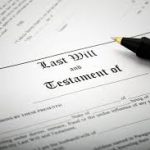Feb 14, 2020 | Uncategorized
 By Attorney Nicholas Thalheimer, Esq.
By Attorney Nicholas Thalheimer, Esq.
Oftentimes when there is a sale of property the seller happens to be an “Estate”, essentially this means that the owner of the property has passed away and an Estate has been opened in the applicable Probate Court.
So, what happens now? The process of opening an Estate involves several steps that must occur before a Personal Representative is appointed and empowered to make a conveyance of estate property. Additionally, even after appointment there are still strict rules that must be followed for a Personal Representative to make a valid conveyance. Every estate opened with either have a will (testate) or not have a will (intestate), either way both will have certain issues that come up.
If an individual passes away without a will the decedent will be considered to have passed away intestate and testate if there was a will. One very big issue in the context of an intestate estate is that there is no will, and if there is no will there is no power to sell in the will, so before a Personal Representative can affect a conveyance of property they would need to obtain a license to sell from the probate court which can take several weeks. Its also not simply enough to have a will to avoid this issue, a will must contain specific language before a Personal Representative is considered to have been granted a power of sale in a will. All too often a poorly drafted will or a “do-it-yourself will” will not have a sufficient power of sale in it, if it has one at all.
Additionally, the Personal Representative is a Fiduciary of the Estate and has a responsibility to the heir/devises of the Decedent and owes them a duty to handle the affairs of the estate property. One very common error are deeds from an estate for nominal consideration (1.00) basically a Personal Representative cannot “gift” property or give it away as it is presumed that a conveyance for nominal consideration is a gift and would likely be considered “a breach of their fiduciary duty” in the same way that a deed executed pursuant to a power of attorney for nominal consideration. The statutes indicate that a Fiduciary Deed must be “for value”.
Another common issue is the time at which a devisee has the power to convey after having taken title through a probate. Basically, an estate has to be “closed” pursuant to the court allowing a “petition for complete settlement and distribution”, at that point the estate property has passed to the heir or devisees as may be the case. Generally, an estate cannot be closed for at least a year as that is the statutory time given for any potential claims against the estate to be filed. Its not infrequent that a Complete Order of Settlement and Distribution is never filed. Under that set of facts it is presumed that after 6 years an heir/devisee has the power to convey from an estate that was never formerly closed as the statutory time in which a Fiduciary has to petition the court to sell estate property for “costs or expenses of administration” will have passed.
Naturally, the conveyance from an estate is ripe with the possibility for errors for the inexperienced conveyancer and its very important to have an experienced conveyancing attorney involved with your transaction as these issues can be spotted early on and resolved as quickly as possible.
As always please contact this office for more information.
Feb 5, 2020 | Uncategorized

Traditionally, a paper Promissory Note associated with a real estate mortgage is a printed paper document which bears the personal ink signature of the borrower. This paper note has an actual “cash” value and the original physical note is held by the lender as if it were actual cash. Unlike a traditional paper note, and eNote is strictly in digital form and must be retained in a secure, digital environment called eVaults, not unlike crypto currency. Watch the video to learn more.
Feb 5, 2020 | Uncategorized
Although the definition of an eClosing can vary from state to state and entity to entity, some definitions associated with eClosings are consistent. Watch the video to learn more..
- eDocuments – Mortgage related documents that are in digital form and not printed
- eSignatures – Personal signatures produced be electronic means and legally recognized as an indivduals signature.
- eNotarization – The official notarization or acknowledgement or witnessing of the signing (of eSigning) of documents, where the signor does not appear in person.
- eRecording – The process of digitally capturing, indexing and archiving title related documents.
- Full eClosing – The execution of electronic mortgage or closing documents that is completed with only eSignatures. The parties involved may or may not appear in person.
- In person eClosing – A closing where all or a portion of the documents executed with an eSignature and the parties involved, or at least the signors, appear in person.
- Remote Online Notary (RON) Closing – The electronic notarization of documents where the signor and the notary do not appear before each other in person, but over a remote digital connection (the internet). – Not recognized in Massachusetts
- Webcam closing – The execution of electronic mortgage or closing documents that is completed with only eSignatures. The parties involved do not appear in person. The entire closing is conducted remotely with eSignatures and RON.
Feb 5, 2020 | Uncategorized

An eClosing is a closing that includes the execution and electronic signature of some key mortgage documents in a secure digital environment, while other key documents may be printed and physically signed (often in the presence of a notary).
The difference between an eMortgage and an eClosing is simply that an eClosing may or may not result in an eMortgage, but eMortgages, which result in an electronic promissory note, are always a product of eClosings. Play the video to learn more.
Oct 3, 2019 | Uncategorized
By Patrick J. Crowley
Regular readers of the Tax Minute know that, under Section 121 of the Internal Revenue Code, you can exclude from taxable income the gain of up to $250,000 for single taxpayers and $500,000 for married taxpayers filing jointly on the sale of the primary residence that you have lived in for 2 out of the last 5 years. However, what many of these listeners don’t know is that there are a whole bunch of exceptions to the 2 out of 5 year rule which will enable you to take this exclusion. The IRS states you can take this exclusion if the primary reason for the sale is the occurrence of unforeseen circumstances. In a recent private letter ruling, the IRS stated that a couple who had 1 child when they purchased a 2 bedroom condo as their primary residence who later had a son prior to meeting the 2 year rule qualified for the reduced maximum exclusion of the gain from the sale of their home as they met the definition of unforeseen circumstances. If you sold your primary residence for a gain and lived their for less than 2 out of 5 years, I suggest you call me on the Tax Line to see if you may have a situation that meets the definition of unforeseen circumstances so that you may be able to avoid tax on the sale of your home.
If you have a question on Section 121 of the Internal Revenue Code – Home Sale Exclusion or any tax matter call Hershman, Fallstrom & Crowley at 508-754-0800
or Email us at pc@hfctax.com.
Nov 19, 2018 | Uncategorized

By Jimm McKinley
Buying your first home is a major milestone, a sign that you’ve made it. It’s also a huge financial decision that can be incredibly stressful at times. If you buy a home in poor condition or spend more than you can comfortably afford, that stress will persist long past closing.
That’s not to say you shouldn’t buy a house — far from it! Homeownership has many benefits, like the freedom to remodel and decorate to your tastes, protection from expensive rent hikes, and the potential to grow your net worth. But if you want home buying to be a good experience, there are a few pieces of advice you need to follow.
1. Get your finances in order before shopping for a mortgage
Lenders factor your income, debt, and credit score when assessing your mortgage application. A large debt load could prevent you from getting a mortgage big enough to buy in your preferred area. A low credit score could land you with a high mortgage rate — and that will cost you.
Before house hunting, pull your credit score and report. Identify factors hurting your credit score, like big credit card balances and accounts in collections. If you improve your credit score before shopping for a mortgage, you’ll benefit from lower rates.
2. Know what you can afford to spend
Just because a lender approves you for a big mortgage doesn’t mean you should spend that much. The amount of house you can actually afford depends on more factors than your income. Take Charge America recommends writing out your monthly household budget to determine what you can afford to spend on housing. Don’t forget to factor other big-picture financial goals like saving for retirement or your kid’s education into your budget, and don’t forget to include the full costs of homeownership, not just the mortgage.. Weigh your mortgage options carefully
Fixed-rate or adjustable-rate, 15-year or 30-year, government-backed or conventional — there are a lot of decisions to make when shopping for a mortgage. Do your research before meeting with lenders. When you’re ready to get pre-approved, shop around with different lenders to compare rates, fees, turnaround times, and other factors.
4. Know your must-haves and your deal-breakers
Don’t get swayed by a beautiful home that’s all wrong for you. Go into your house hunt with a clear understanding of the characteristics your home absolutely must have and the ones you can’t tolerate in a house.
It’s not much use listing requirements if they don’t match what’s actually available in your market. As you dream up your perfect home, research homes for sale in your area to get a feel for the options. With homes selling around $253,000 in Leominster, MA, first-time buyers can find great homes within their budget. However, you might realize you need to compromise on certain features to find a home you can afford.
5. Don’t wait until the last minute to start packing
Square Cow Movers puts it perfectly: “The sooner you start packing the less stressful the process will be.” Start packing as early as possible, beginning with items that are rarely used. You won’t miss off-season clothes, lawn equipment, and recreational gear if they spend a few weeks boxed up. And by packing it now, you spare yourself added stress when you’re busy closing a sale and moving. Packing early also gives you ample time to downsize your stuff so you don’t pay to move unwanted items.
Buying a home that’s all yours is a lot different than moving to a new rental. Searching for homes, applying for a mortgage, and closing on a sale are all complicated and time-consuming. Rather than navigate your first home purchase alone, hire a team of professionals to help you through the process. You’ll not only save yourself stress, you’ll buy feeling confident about your purchase.
Image via Unsplash
 By Attorney Nicholas Thalheimer, Esq.
By Attorney Nicholas Thalheimer, Esq.



